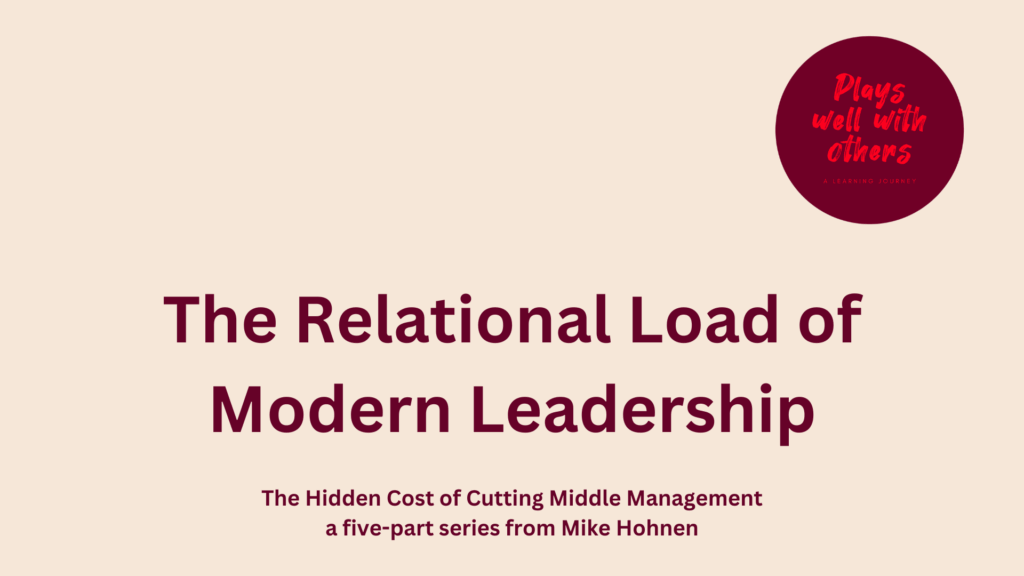In my previous posts, I’ve explored the hidden costs of cutting middle management and the psychological toll of wider spans of control.
Today I want to dig into something that’s both the problem and the solution: the relational load that modern leaders carry.

? Relationship Quality as a Matter of Luck
Here’s what I observe time and again: most managers treat relationship quality as something secondary, something left entirely to chance.
“Sometimes you’re lucky and get people you click with. Most times you’re not so lucky and you don’t get on. That’s just life.”
There’s no awareness that they could actually take responsibility for the quality of these relationships. No understanding of how profoundly relationship quality influences the meaningfulness and effectiveness of work itself.
They’re managing as if relationships are fixed, predetermined by personality compatibility rather than something that can be intentionally cultivated and improved.
? The Liberating (and Terrifying) Realisation
What emerges repeatedly in coaching sessions – often in follow-up emails filled with excitement – is this profound AHA moment:
“I am the solution.”
It’s both liberating and overwhelming. Liberating because suddenly they have agency where they felt powerless. Terrifying because now they’re responsible for something they’ve never been taught how to do.
But here’s what’s beautiful: once that realisation hits, they become intensely curious about what they need to do differently. This is where real transformation begins.
? There’s No Universal Playbook
The challenge is that relationship building can’t be reduced to a checklist of “10 things every manager should do.” It’s deeply individual. Each person needs to develop their own authentic way of approaching this.
Extroverts often have an easier time initially – they’re naturally comfortable with interpersonal connection. But they frequently fall into the trap of being superficial, mistaking charm for depth.
Introverts typically struggle at first, but once they understand what’s needed, they develop much more profound relationships. Why? Because they’ve been programmed to think they need to be like extroverts – loud, charismatic, leading from the front.
? Leadership from Behind
But that’s not true. Introverts can absolutely be their introverted selves and build extraordinary relationships. They just need to find ways that make their introversion work for them:
- One-on-one conversations
- Deep listening
- Thoughtful follow-up
- Creating space for others to shine
There’s no need to stand on a soapbox and shout.
Some of the most powerful leadership happens from behind – quietly influencing, deeply connecting, creating conditions where others thrive.
? The Analytical Manager’s Breakthrough
Then there’s perhaps the most common case I encounter: the analytical manager who believes emotions don’t belong in the workplace, that they themselves aren’t subject to emotions, or they simply can’t understand why other people need to express feelings at work.
The breakthrough moment comes when they realise that emotions aren’t unprofessional interference – they’re fundamental data about human motivation, engagement, and performance.
Including their own.
?? The Real Load
The relational load of modern leadership isn’t just about managing more relationships. It’s about taking active ownership of relationship quality and recognising that how you connect with your people directly determines their engagement, growth, and performance.
It’s about shifting from “we just don’t get on” to “how can I make this relationship work better?”
That’s both a heavier load and a lighter one.
Heavier because you’re now responsible for something you used to leave to chance.
Lighter because you finally have agency over one of the most crucial aspects of your effectiveness as a leader.
When managers make this shift, something remarkable happens: they don’t just cope with larger spans of control – they transform them into networks of meaningful connection.
How do you take ownership of relationship quality in your leadership role?
Next week: How trust erodes invisibly – and what repair actually looks like.
#Leadership #Management #Relationships #WorkplaceCulture #PeopleManagement